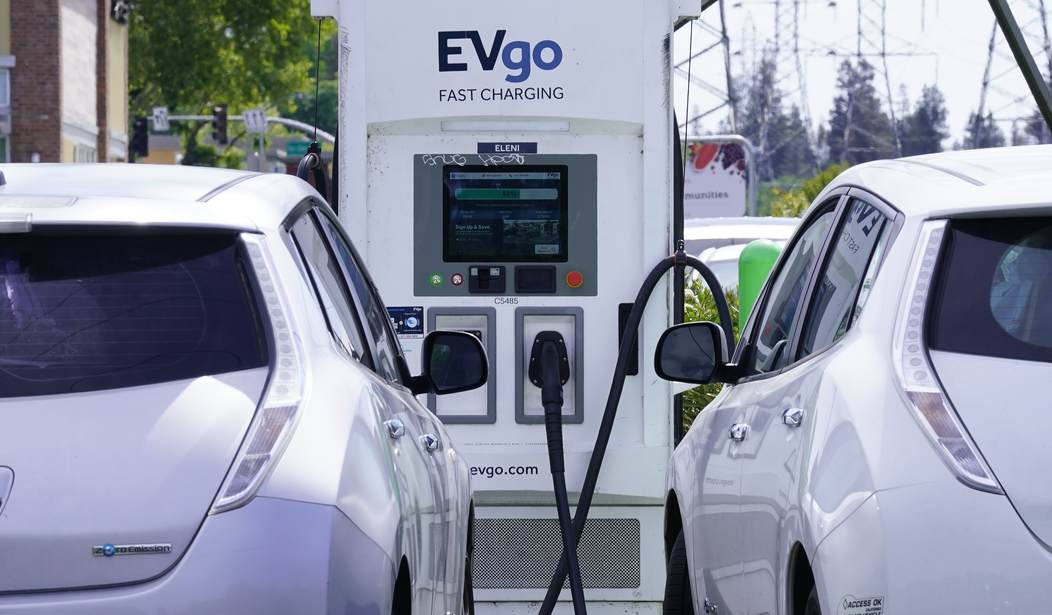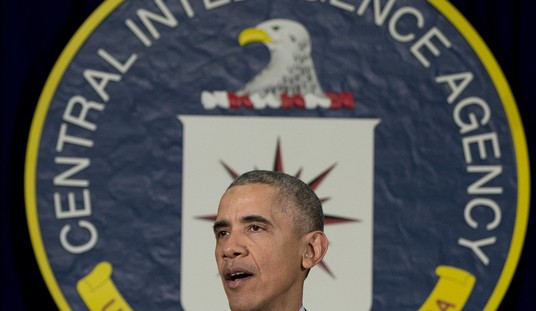Electric vehicles have been on the market for a few years now. They started as — and largely remain — a niche market product. They are practical for urban commuters, of course, and for suburban folks who make short trips on a daily basis to the grocery store (at least those who can still afford groceries under the Harris/Biden economy), dropping kids off at school, and so on.
And, of course, the green energy folks and climate change alarmists are touting electric vehicles (EVs) as the answer to the heating world's woes, many times proclaiming them to be "emissions-free," although anyone who understands energy production and distribution understands that the use of electric vehicles just shifts the emissions elsewhere — the only instance in which this claim would be accurate would be when one's electricity comes from nuclear power, which the greens/climate change people also oppose.
Markets, though, can't be held in check forever. An editorial Tuesday at Issues & Insights provides some interesting data on how the American and European automobile markets have largely spewed electric vehicles out of their mouths, and how unsold EVs are piling up on dealer's lots.
Last week, the House approved a resolution to block the Biden administration’s emissions rule that would require more than half of the automobiles sold in the new-car market to be electric by 2032. The 215 representatives who voted for the bill, including eight Democrats, are far more in tune with most of the country than the White House. The “deplorables” and “bitter” clingers of the industrialized world are rejecting electric vehicles.
Nationwide, the inventory of unsold EVs had grown by nearly 350% over the first half of 2024, creating “a 92-day supply — roughly three months’ worth of EVs, and nearly twice the industry average,” says Axios, which is 54 days for gasoline-powered vehicles.
Ford, which lost nearly $73,000 on each EV it sold in the second quarter of 2023, continues to yield to reality, now ditching its plans to build a large electric SUV. This “course change,” says Just the News, “comes amid lower-than-expected demand for electric vehicles.”
It seems clear the market has spoken, concerns about the climate notwithstanding. And it's not just American auto buyers that are hesitant to go all-in on battery-powered cars. European consumers are also showing a distinct lack of enthusiasm for this technology.
“Of the U.S. consumers planning on purchasing a new vehicle in the next 24 months, only 34% intend to purchase an EV, down 14% from 48% in the 2023,” says Ernst & Young’s Mobility Consumer Index, “a global survey of almost 20,000 consumers from 28 countries.”
The story is much the same in Britain. EVs “are losing value at an ‘unsustainable’ rate as a slowdown in consumer demand sends used car prices tumbling,” the Telegraph reported last week. Meanwhile in France, “the EU’s second largest market for battery electric vehicles behind Germany,” deliveries have fallen by a third.
Germans are likewise losing interest, as the country has “suffered a ‘spectacular’ drop in electric car sales as the European Union faces growing calls to delay its net zero vehicle targets,” the Telegraph said in a separate story.
Maybe because they aren't practical for as many drivers as once thought? Maybe because their battery life isn't all that it was promised to be? Maybe because consumers don't want to wait an hour or more for a minimal charge to proceed on a road trip as opposed to five minutes to fill the tank of a traditional benzene burner? Urban and some suburban folks may find them practical, and they, of course, are free to choose an EV if it suits them. But small-town and rural dwellers may find them less than practical, especially in climates where it is cold much of the year, as cold temperatures can dramatically reduce an EV's range.
Here's the onion:
National Public Radio, which speaks to and for the political left, argues that “EVs are better for the environment than gas cars,” and laments that more Americans have doubts about electric vehicles’ eco-integrity. EVs, says NPR, “are caught up in the culture wars.”
There might be some truth there. Many Americans are fed up with elected and unelected officials forcing their preferences on them. It’s a culture of independence at war with a culture of coercion.
Ay, there's the rub. EVs are better for the environment, or so NPR claims — and we know what a bastion of rational information based on the impartial analysis of facts that NPR is. But are they? Electricity doesn't magically arise from the ground, and in most of the developed and developing world, electrical generation is still powered by natural gas and coal, meaning that EV use just shifts the emissions back up the chain; energy use is energy use, and it's also important to note that there is some loss due to entropy at every step.
Thermodynamics is a harsh mistress. As are market forces. In any conflict between market forces and thermodynamics on one hand and green activism on the other, my money's on the market forces/thermodynamics.
See Related: Ford Expanding Super Duty Production: Is an Electric Super Duty in the Works?
Hey, Big Spender - the Manifest Failures of the Biden/Harris Infrastructure Plan
But it seems likely that, as Issues & Insights points out, the market is simply reasserting itself. Yes, plenty of Americans and, I suspect, many people elsewhere don't appreciate the heavy hand of government pushing them to make "approved" economic decisions. I also suspect many people are fed up with finger-wagging watermelons and climate change doom criers gluing themselves to roadways while shouting about the need to end fossil fuels. It's entirely possible that every person who was an hour late to work due to the actions of these jackwagons will not look kindly on some car salesman needling them about "clean" electric vehicles, and may just look to a hybrid or traditional internal-combustion auto instead.
Of course, as with so many things, it all comes down to markets. The market forces can be delayed, they can be fiddled with, and they can be tilted to some degree by taxation or subsidy, but the market cannot be forever denied — and it seems that the market for "green" electric autos is asserting itself, as evidenced by the electric vehicles stacking up, unsold, on dealers' lots.













